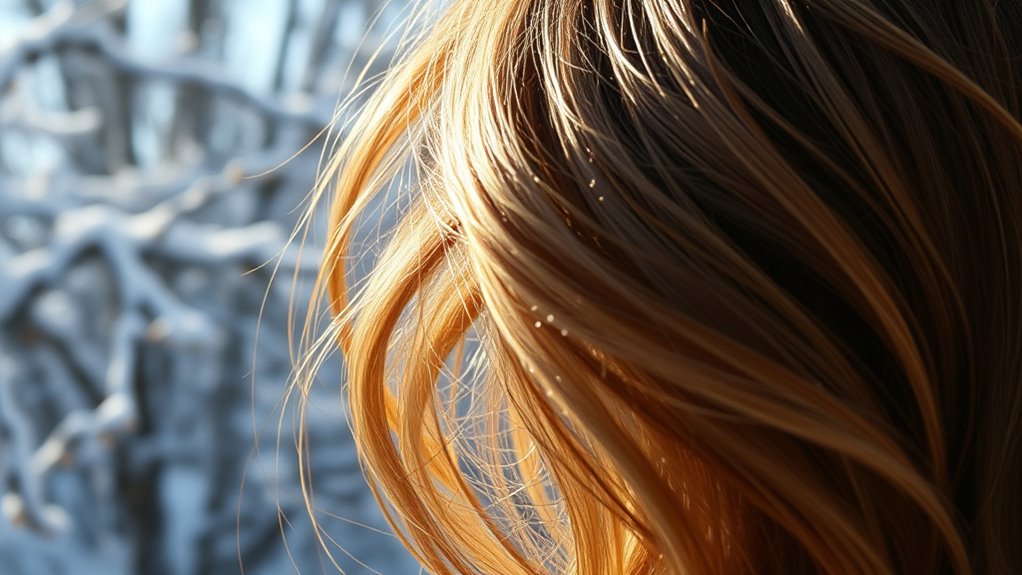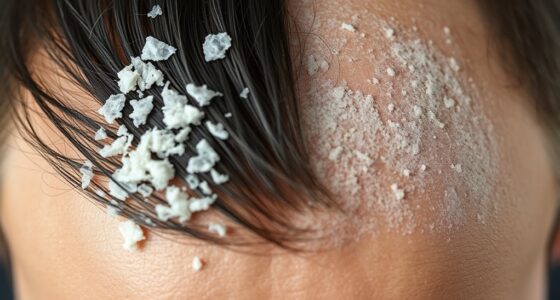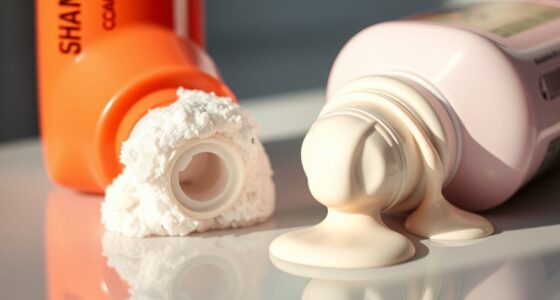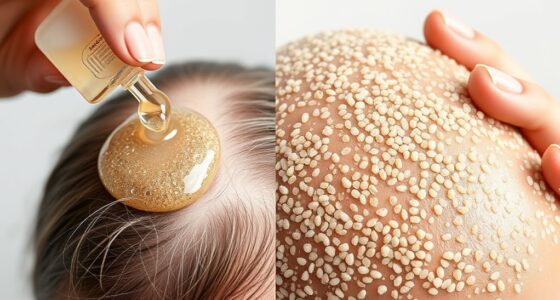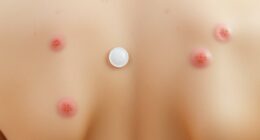In winter, you need to focus on balancing indoor humidity to prevent dry, brittle hair by using humidifiers and nourishing treatments with oils. Use lukewarm water to wash your hair and avoid heat styling to reduce damage. Protect your hair from static and cold air with anti-static serums and scarves. Eating a balanced diet and staying hydrated also boost moisture from within. Keep exploring tips to keep your hair healthy all season long.
Key Takeaways
- Use deep conditioning and leave-in treatments to maintain moisture during dry, cold seasons.
- Wash hair with lukewarm water and avoid hot showers to prevent moisture loss.
- Apply anti-static serums and use protective accessories like hats to reduce static and damage from dry air.
- Incorporate humidifiers indoors and protect hair with nourishing serums before covering.
- Support hair health through a balanced diet rich in essential nutrients and stay well-hydrated.
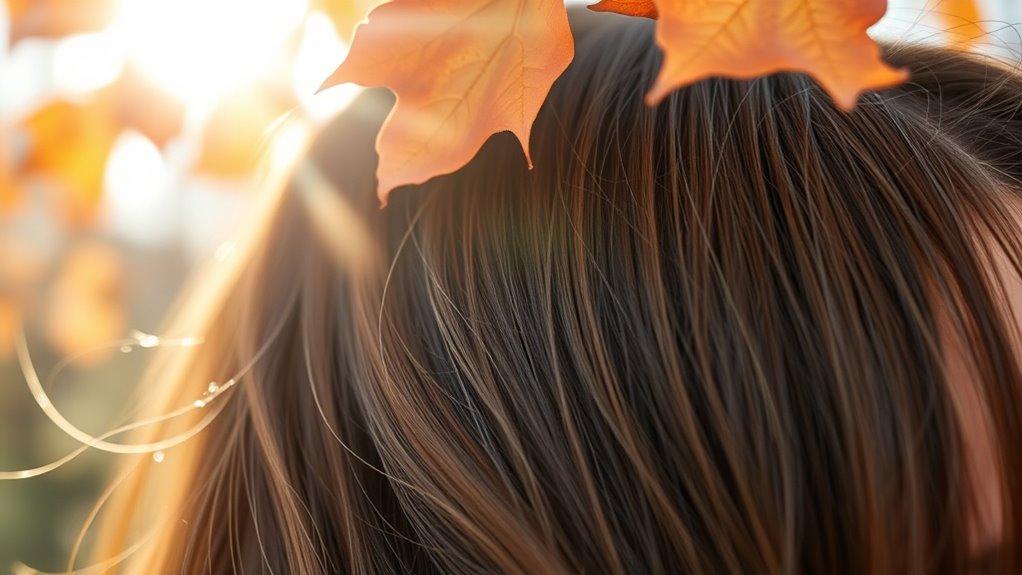
As the seasons change, so do the needs of your hair. In colder months, like winter, your hair faces unique challenges that require specific care routines. One of the most important aspects is humidity control. During winter, the air tends to be dry, stripping moisture from your hair and scalp. This dryness can lead to brittle strands, dullness, and increased breakage. To combat this, you need to focus on winter hydration. Incorporate deep conditioning treatments into your routine, using products rich in nourishing oils and humectants that draw moisture into your hair. Regularly applying a leave-in conditioner can also help seal in hydration and protect your strands from the dry, cold air outside. When you shower, avoid hot water, as it can further dry out your hair. Instead, opt for lukewarm water, which cleanses without stripping away essential moisture. After washing, gently pat your hair dry rather than rubbing it vigorously with a towel to prevent damage.
In winter, you might also notice increased static and flyaways. This is partly due to the lack of humidity in the air, which makes your hair more prone to frizz. To manage this, consider using anti-static sprays or serums that smooth the cuticle and tame flyaways. These products create a barrier that helps lock in moisture and keep your hair looking sleek. Wearing a hat or scarf not only keeps you warm but also minimizes exposure to harsh, dry air that can cause further dehydration. Just make sure to choose fabrics that won’t cause friction or breakage, and always apply a nourishing serum beforehand to create a protective layer.
Finally, don’t forget that winter hydration isn’t only about external care. Your diet plays a role too. Drinking plenty of water helps maintain your hair’s moisture levels from the inside out. Incorporate foods rich in omega-3 fatty acids, vitamins A, C, and E, which support healthy hair growth and hydration. If you live in a particularly cold or dry climate, consider using a humidifier at home to add moisture to the air, further aiding in humidity control. Overall, adjusting your hair care routine for winter’s unique conditions will keep your hair healthier, shinier, and more resilient throughout the season.
Frequently Asked Questions
How Can I Prevent Hair Color Fading in Different Seasons?
To prevent hair color fading across seasons, you should prioritize shade safeguarding by using color-safe shampoos and conditioners. Limit exposure to sun and chlorinated water, which can accelerate color loss. Also, consider deep conditioning treatments to maintain hair health, making color preservation easier. Wearing a hat or scarf outdoors helps shield your hair from environmental damage. Regular touch-ups can keep your color vibrant year-round, ensuring your shade stays fresh and beautiful.
What Are Best Hair Masks for Seasonal Dryness?
You should try hair masks with nourishing ingredients like honey, coconut oil, or avocado for seasonal dryness. DIY hair masks are easy and effective—mix these ingredients with yogurt or aloe vera for extra moisture. Apply your mask weekly, focusing on mid-lengths and ends, to restore hydration and prevent breakage. These natural remedies help your hair stay soft, shiny, and healthy through any season.
How Does Seasonal Change Affect Scalp Health?
Seasonal changes can impact your scalp health by causing fluctuations in scalp moisture, making it prone to dryness or excess oil. Cold weather often leads to dryness, increasing seasonal dandruff, while humidity can foster oil buildup and irritation. You might notice flaky scalp or itchiness. To combat this, adjust your hair care routine with moisturizing shampoos and scalp treatments, keeping your scalp balanced and healthy throughout the seasons.
Can Specific Hairstyles Protect Against Seasonal Damage?
Yes, specific hairstyles can protect against seasonal damage. Protective styling keeps your hair tucked away, reducing exposure to environmental stressors like humidity, heat, or cold. Use styles that minimize heat styling and incorporate heat protection products when you do use heat tools. Braids, buns, and twists help shield your hair, preventing breakage and dryness, so your hair stays healthier through changing seasons.
Are There Seasonal Hair Supplements Recommended for Hair Strength?
Think of your hair as a delicate garden needing extra care through changing seasons. You should consider taking hair vitamins and collagen supplements, which act like nourishing rain for your strands. These supplements boost hair strength from within, helping to fortify against seasonal stressors. Incorporate them into your routine to support resilient, healthy hair year-round, ensuring your locks remain vibrant and strong amidst humidity, heat, or cold.
Conclusion
So there you have it—your foolproof guide to surviving the chaos of seasonal hair care. Whether you’re battling humidity’s frizz, heat’s damage, or cold’s dryness, just remember: your hair’s resilience is only outmatched by your ability to ignore basic advice. Embrace the wild ride, toss some conditioner in the air, and hope for the best. After all, who needs perfect hair when you can have a hilarious, frizz-filled adventure?
